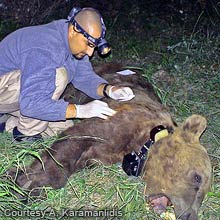

 |
||
 |
||
Vol. 8 (1): May 2005 |
Download this article
|
|
HAS ZEUS GONE MAD?by Alexandros A. Karamanlidis
|
 |
|
|
|
Zeus – the father of the ancient Greek gods. Renowned and respected for his incredible strength and cunning, there was nothing that could strike greater fear into a mortal soul than the wrath of the headmaster of Mount Olympus. …or almost nothing! Because, becoming a subject of one of his legendary pranks could often have the same, deadly outcome!
I first experienced the tenacity and cunning with which Zeus prepared his little “jokes” in 2003, whilst carrying out my doctoral thesis on the ecology and conservation genetics of the brown bear (Ursus arctos). During my field work I discovered a very peculiar aspect of brown bear marking behaviour. Unlike bears throughout the world that “announced” their presence by marking on trees, Greek bears showed an incredible propensity for marking electricity poles. All the analysis of the data I had collected up to then implicated the absence of human activity as one of the driving forces of this “abnormal” behaviour. Then however, in the spring of 2003, a colleague called me from a small village in the south-western foothills of Mount Olympus to investigate an alleged case of livestock depredation by a bear. On site, I realised that the damage had indeed been inflicted by a bear. Closer inspection of the surrounding area also revealed marking behaviour on electricity poles – but this in an area that was well outside the species’ distribution range in the country and in an area of intense human and livestock activity. All the theories I had set up on the marking behaviour of the species and my aspirations to “academic glory” had virtually been swept away by a single event!
Why was Zeus being so mean to me?
More than a year later, as a member of the MOm (Hellenic Society for the Study and Protection of the Monk Seal) I was going through scientific literature looking for information on habitat selection and breeding behaviour of the species. Contemporary knowledge had it that humans were responsible for the monk seal’s demise by depriving them of essential breeding habitat and forcing them to give birth in unsuitable locations where pup mortality was high. The most frequently propagated measure to reverse this situation was the establishment of strictly protected areas, where human activity (and in turn, monk seal activity) would be influenced. Then, during a stormy October day in 2004 another call came to shake my world. The Rescue and Information Network of MOm had been informed of the presence of a newborn pup struggling for his life at a small village at the eastern foothills of Mount Olympus! Inspecting the site, things turned really wild. On a small stretch of beach right next to a luxury holiday resort amidst houses and hotels, a newborn monk seal pup was resting on a beach under the wary surveillance of his mother, who was watching him from a secure distance in the sea.
Over the following month, every time I visited the area and watched, together with the people of the village, the young seal grow older, I could not get this one thought out of my mind! Could there be a remote possibility that two dead-spoken species, Greece’s rarest terrestrial and rarest marine mammal, had “met”? Here, at the foothills of Mount Olympus, amongst basking tourists and hard-working shepherds? Was this the dawn of a new biological order in our country, or had Zeus gone mad, and was this simply another one of his practical jokes?
The answer to latter question has to be clearly: NO!
After serious thinking it appears to me that Zeus, in his eternal wisdom, wanted to teach a young cocky biologist a good lesson or two. The first could be one of keeping science and in turn, conservation actions too, in perspective. Nature is too complex to fit into a textbook, and statistical confidence intervals are nice and impressive when presented in scientific conferences but at the bottom line can account only for a fraction of the underlying truth. The real beauty of nature and its creatures lies in their unpredictability and tendency to act against what we humans perceive of as “normal”. One has to keep this in mind and be prepared to act accordingly. Having said this, lesson number two should give us reason to think over our conservation actions. The establishment of protected areas is without doubt an important instrument in protecting endangered species. But it is not a panacea. With human, and hopefully also endangered species populations increasing, we will sooner or later run out of available space. And secondly, because humans and endangered species are members of the same biological system. Mutual exclusion does not allow both of them to “function” properly.
Moreover, the solution should be sought in two words that are highly correlated. “Tolerance” and “education”. Tolerance for the shepherd who has to graze his flock and the bear that needs a healthy forest; tolerance for the tourist who needs a beach and the monk seal that needs an appropriate place to give birth. And education – in its broadest sense – in order to understand how and why all this HAS to be.
Brown bears and monk seals in Greece are apparently showing progress in both of these areas lately. Are humans too?
Alexandros A. Karamanlidis, May 2005.
Copyright © 2005 Alexandros A. Karamanlidis, The Monachus Guardian. All Rights Reserved |